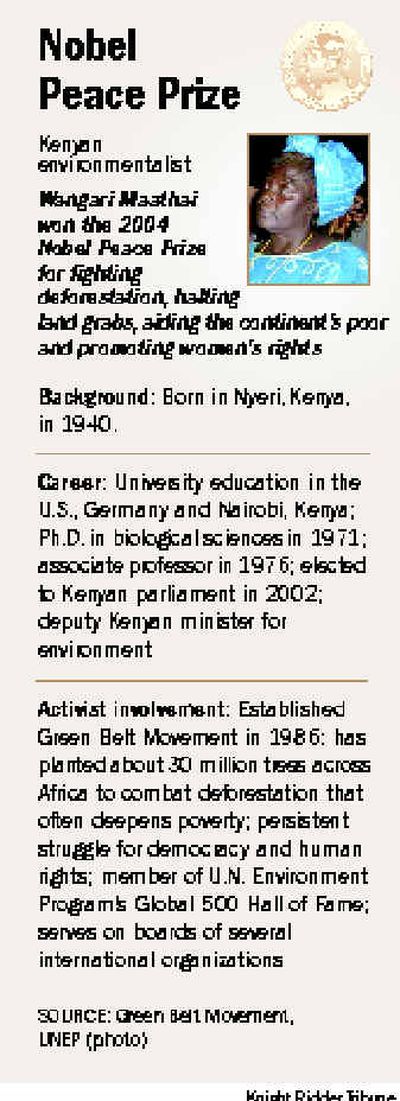Kenyan wins Nobel Peace Prize

NYERI, Kenya – A Kenyan environmental activist who for 30 years has battled to stop deforestation, empower women and halt government land grabs won the 2004 Nobel Peace Prize on Friday, the first African woman to take the award.
Wangari Maathai, 64, the country’s deputy environmental minister and leader of its Green Belt Movement, said she was shocked and delighted at her surprise selection.
At a ceremony near her home and in sight of Mount Kenya, home of the some of the country’s largest remaining forest reserves, Maathai said she was “overwhelmed” and thanked her supporters, promising to put her $1.3 million prize to work in the Green Belt campaign, which has overseen the planting of 30 million trees across Africa.
“We believe that Maathai is a strong voice speaking for the best forces in Africa to promote peace and good living conditions on the continent,” the Nobel committee noted in its commendation, the first to an environmentalist. The committee praised Maathai for her effort to “promote ecologically viable social, economic and cultural development” in Africa and for an approach “that embraces democracy, human rights and women’s rights.”
Maathai, an archfoe of former President Daniel arap Moi, led a campaign to block government seizures of public-owned forests and parkland for allocation to political allies and developers. One of her most notable achievements was stopping construction of a 62-story skyscraper planned by Moi’s party for sprawling Uhuru Park, Nairobi’s major public green space.
The ruling party was eventually forced to discard the plan after Maathai filed a lawsuit and then organized an international pressure campaign against the project, leading its developers to pull out.
In her years of battling government, Maathai has been harassed, arrested and beaten, once until she was unconscious. On waking, she quickly called a news conference in her hospital room. On another occasion she signed a complaint against her attackers in her own blood at a police station.
“She’s been on the forefront against land grabbing, and she’s done it more or less on her own,” said Simon Ole Kaparo, a Kenyan human rights activist. “We’re greatly honored, and I think many Kenyans are going to be celebrating this with her.”
Worried by widespread soil erosion and growing desertification in Kenya, Maathai launched her Green Belt Movement in 1977, with an aim of reversing the 90 percent loss of Kenya’s original forest. Besides protecting the environment, the University of Nairobi anatomy professor wanted to improve the lives of Kenyan women, many of whom still spend long hours each day searching for cooking firewood.
As head of the National Council of Women of Kenya, she organized a tree-planting campaign around Nairobi to improve public green spaces, create green belts and encourage the planting of trees, particularly in poor settlements. As part of the effort, communities set up tree nurseries, children planted trees on school grounds and the council paid poor women a small stipend for planting saplings of native species such as figs, cedars, baobabs and acacias.
Eventually the program spread nationwide and then internationally to other African countries suffering similar deforestation.
Maathai is widely seen as a champion of the poor in Kenya, particularly women, and a leader in the country’s long fight against government corruption. She was elected to parliament in 2002, as Moi left power after 24 years as president, and in 2003 she was appointed deputy minister of the environment, natural resources and wildlife under President Mwai Kibaki’s government.
Over the past three decades, Maathai and her movement have won dozens of environmental prizes. But before Friday she was considered a long shot in the Nobel competition, which drew a record 194 nominations this year. Speculation on the likely winner had focused on Mohamed ElBaradei, head of the International Atomic Energy Agency, which had sought to answer questions about the existence of weapons of mass destruction in Iraq.
Maathai, who will formally receive her prize Dec. 10 in Oslo, joins Ghanaian Kofi Annan and South Africans Nelson Mandela, F.W. de Klerk, Desmond Tutu and Albert John Lutuli in the list of African Nobel Peace Prize winners.